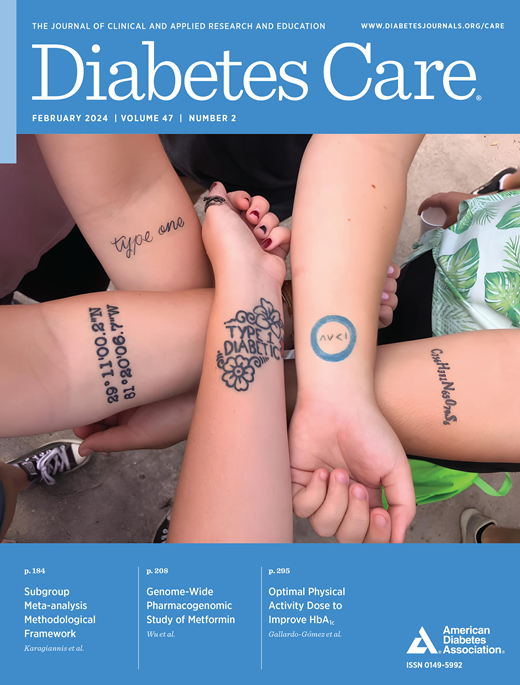Glycemic Control, Cognitive Aging, and Impairment Among Diverse Hispanics/Latinos: Study of Latinos–Investigation of Neurocognitive Aging (Hispanic Community Health Study/Study of Latinos)
IF 14.8
1区 医学
Q1 ENDOCRINOLOGY & METABOLISM
引用次数: 0
Abstract
OBJECTIVE Hispanics/Latinos in the United States have the highest prevalence of undiagnosed and untreated diabetes and are at increased risk for cognitive impairment. In this study, we examine glycemic control in relation to cognitive aging and impairment in a large prospective cohort of middle-aged and older Hispanics/Latinos of diverse heritages. RESEARCH DESIGN AND METHODS Study of Latinos–Investigation of Neurocognitive Aging (SOL-INCA) is a Hispanic Community Health Study/Study of Latinos (HCHS/SOL) ancillary study. HCHS/SOL is a multisite (Bronx, NY; Chicago, IL; Miami, FL; and San Diego, CA), probability sampled prospective cohort study. SOL-INCA enrolled 6,377 diverse Hispanics/Latinos age 50 years and older (2016–2018). The primary outcomes were cognitive function, 7-year cognitive decline and mild cognitive impairment (MCI). The primary glycemia exposure variables were measured from fasting blood samples collected at HCHS/SOL visit 1 (2008–2011). RESULTS Visit 1 mean age was 56.5 years ± 8.2 SD, and the average glycosylated hemoglobin A1C (HbA1c) was 6.12% (43.5 ± 14.6 mmol/mol). After covariates adjustment, higher HbA1c was associated with accelerated 7-year global (b = −0.045; 95% CI = −0.070; −0.021; in z-score units) and executive cognitive decline, and a higher prevalence of MCI (odds ratio = 1.20; 95% CI = 1.11;1.29). CONCLUSIONS Elevated HbA1c levels were associated with 7-year executive cognitive decline and increased MCI risk among diverse middle-aged and older Hispanics/Latinos. Our findings indicate that poor glycemic control in midlife may pose significant risks for cognitive decline and MCI later in life among Hispanics/Latinos of diverse heritages.不同西班牙裔/拉美裔的血糖控制、认知老化和损伤:拉美裔研究--神经认知老化调查(拉美裔社区健康研究/拉美裔研究)
目的 在美国,西班牙裔/拉美裔未确诊和未治疗糖尿病的发病率最高,认知障碍的风险也更高。在本研究中,我们将在一个大型前瞻性队列中,研究不同血统的中老年西班牙裔/拉美裔人群的血糖控制与认知老化和认知障碍的关系。研究设计和方法 拉丁人神经认知老化调查研究(SOL-INCA)是西班牙裔社区健康研究/拉丁人研究(HCHS/SOL)的一项辅助研究。HCHS/SOL 是一项多地点(纽约州布朗克斯、伊利诺伊州芝加哥、佛罗里达州迈阿密和加利福尼亚州圣地亚哥)、概率抽样的前瞻性队列研究。SOL-INCA 共招募了 6377 名年龄在 50 岁及以上的西班牙裔/拉美裔美国人(2016-2018 年)。主要结果为认知功能、7 年认知功能下降和轻度认知障碍(MCI)。主要血糖暴露变量由 HCHS/SOL 第 1 次就诊(2008-2011 年)时收集的空腹血样测量得出。结果 第 1 次就诊时的平均年龄为 56.5 岁 ± 8.2 SD,平均糖化血红蛋白 A1C (HbA1c) 为 6.12% (43.5 ± 14.6 mmol/mol)。经过协变量调整后,较高的 HbA1c 与 7 年的整体(b = -0.045;95% CI = -0.070;-0.021;以 z 评分单位表示)和执行认知能力下降速度加快以及 MCI 患病率较高(几率比 = 1.20;95% CI = 1.11;1.29)有关。结论 HbA1c 水平升高与不同的中老年西班牙裔/拉美裔人的 7 年执行认知能力下降和 MCI 风险增加有关。我们的研究结果表明,中年时期血糖控制不佳可能会对不同血统的西班牙裔/拉美裔人日后的认知能力下降和 MCI 构成重大风险。
本文章由计算机程序翻译,如有差异,请以英文原文为准。
求助全文
约1分钟内获得全文
求助全文
来源期刊

Diabetes Care
医学-内分泌学与代谢
CiteScore
27.80
自引率
4.90%
发文量
449
审稿时长
1 months
期刊介绍:
The journal's overarching mission can be captured by the simple word "Care," reflecting its commitment to enhancing patient well-being. Diabetes Care aims to support better patient care by addressing the comprehensive needs of healthcare professionals dedicated to managing diabetes.
Diabetes Care serves as a valuable resource for healthcare practitioners, aiming to advance knowledge, foster research, and improve diabetes management. The journal publishes original research across various categories, including Clinical Care, Education, Nutrition, Psychosocial Research, Epidemiology, Health Services Research, Emerging Treatments and Technologies, Pathophysiology, Complications, and Cardiovascular and Metabolic Risk. Additionally, Diabetes Care features ADA statements, consensus reports, review articles, letters to the editor, and health/medical news, appealing to a diverse audience of physicians, researchers, psychologists, educators, and other healthcare professionals.
 求助内容:
求助内容: 应助结果提醒方式:
应助结果提醒方式:


